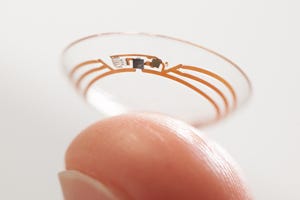Suddenly, Google Glass and the ever-expanding universe of wearable devices that monitor everything from fitness levels to vital signs seem obsolete.
July 16, 2014
Suddenly, Google Glass and the ever-expanding universe of wearable devices that monitor everything from fitness levels to vital signs seem obsolete.
 After unveiling in January 2014 a prototype contact lens that could continuously monitor blood glucose levels in diabetics, Google this week announced a licensing agreement with life sciences giant Novartis (Basel, Switzerland) to develop and commercialize the smart lens technology for all ocular medical uses. But helping diabetics manage their condition without having to take blood samples throughout the day is just the tip of this technology iceberg.
After unveiling in January 2014 a prototype contact lens that could continuously monitor blood glucose levels in diabetics, Google this week announced a licensing agreement with life sciences giant Novartis (Basel, Switzerland) to develop and commercialize the smart lens technology for all ocular medical uses. But helping diabetics manage their condition without having to take blood samples throughout the day is just the tip of this technology iceberg.
Novartis also has its eye on developing a remedy for people suffering from presbyopia, a condition that prevents them from reading without wearing corrective glasses. "The smart lens has the potential to provide accommodative vision correction to help restore the eye's natural autofocus on near objects," notes a press release announcing the licensing agreement. Think autofocus camera. A device of this kind is "the holy grail of vision care," Novartis CEO Joe Jimenez said during a phone interview with media outlets.
It makes one wonder what else a smart contact lens could monitor or, indeed, what bionic breakthroughs it could engender.
A game changer in a multibillion dollar market
The agreement between Google[x], the secretive team within Google that developed the smart lens (as well as the self-driving car that you may have heard about), and Novartis' eye-care division Alcon would allow Novartis to compete in the global blood-sugar tracking market that is projected to be worth more than $12 billion by 2017, according to research firm GlobalData. From the patient perspective, it would immeasurably improve quality of life.
The smart lens includes a small wireless chip and glucose sensor embedded between two layers of soft contact lens material. The device measures blood-glucose levels in eye fluid and communicates the data to a mobile device.
Novartis CEO Joe Jimenez told the Financial Times he "would be disappointed if the first lens was not ready for commercialization within the next five years." He also told Reuters that, although the licensing deal is only for ocular purposes, thought is being given to how the technology could be applied in other areas, such as remote patient monitoring in heart failure.
"This really brings high technology and combines it with biology, and that's a very exciting combination for us," Jimenez added.
About the Author(s)
You May Also Like




